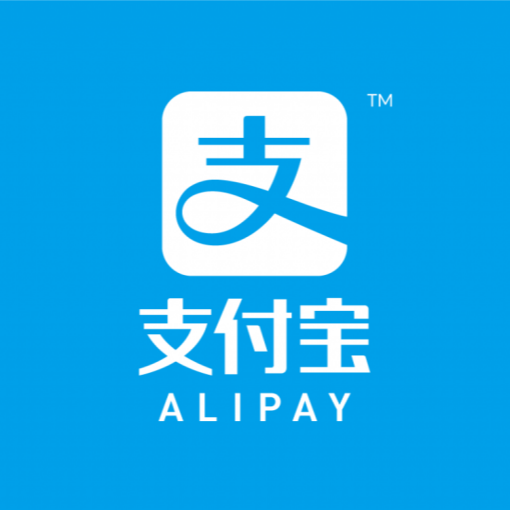Alipay is everywhere in China—used for street food, taxis, hotel bookings, utility bills, and even hospital payments. But as its use grows, so do the concerns. In recent years, scams involving fake QR codes, phishing apps, and refund fraud have raised questions: is Alipay really safe? This guide breaks it down. We’ll look at its built-in security tools, how it protects your data, what scams to watch for, and how China’s laws regulate it. No jargon—just clear answers for anyone using Alipay in 2025.
What Is Alipay and How Can Foreigners Use It in 2025?
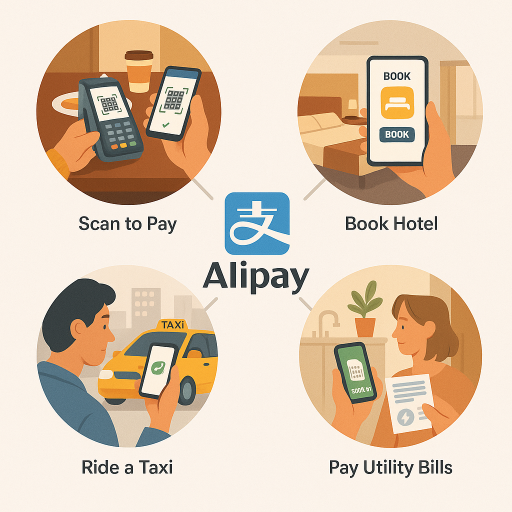
Common Ways Alipay Is Used in Everyday Life
Alipay’s Features and How to Use It?
Alipay is more than a mobile wallet—it’s how people in China pay for almost everything. From metro rides and street food to hotel bookings and phone top-ups, it’s all in one app. It also offers Huabei credit, savings tools, and international shopping. Whether you're at a luxury mall or a noodle stand, chances are you’ll pay with Alipay. Many newcomers ask, is Alipay safe for all these services? Thanks to real-time alerts, encryption, and biometric login, the answer is yes.
Even better, you don’t need a Chinese bank account. In 2025, you can register with your passport and foreign phone number. Choose the “Tour Pass” or “International Version” for visitors. Once verified, link your Visa, MasterCard, or JCB, or load Yuan into a 90-day wallet. Alipay’s safety tools protect your card info and alert you instantly if anything’s off. Simple, secure, and made for travelers.If you still have questions, check out this article—it walks you through how to register and use it step by step.
Alipay Payment Methods Explained
Alipay gives you more than one way to pay—and that’s useful when you’re visiting a place with varied infrastructure. Here’s a breakdown of the most common options:
| Method | Description | Who Should Use It |
|---|---|---|
| Alipay Wallet | Load money into your balance and pay directly | Good for longer stays |
| Mobile Banking App | Transfer via your bank’s app linked to Alipay | Residents with Chinese bank |
| Bank Transfer | Transfer directly to Alipay using account number | Trusted in long-term use |
| Online Banking | Pay through redirected bank login portals | Tech-savvy users |
| Bank Cards | Link Visa/MasterCard/JCB for direct payments | Tourists and business travelers |
| OTC (Offline Cash) | Top-up at partner kiosks or banks with your passport | Cash-carrying short-term visitors |
Each method has pros and cons. For example, cards are convenient, but some local shops may not accept foreign-linked wallets. Bank apps require local accounts, but offer full integration. If in doubt, try Tour Pass first—it’s built for travelers.
Is Alipay Safe to Use for Payments and Transfers?
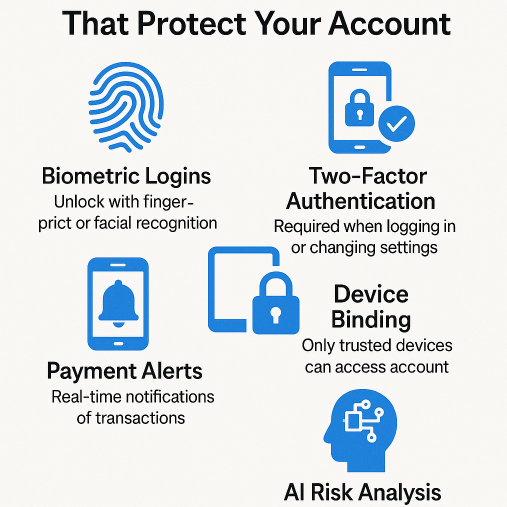
Alipay’s Security Measures
Built-In Security Tools That Protect Your Account
Many travelers ask, is Alipay safe when it comes to protecting their money. In fact, Alipay has more security layers than most people expect. First, it uses biometric logins—you can unlock your account with fingerprint or facial recognition. Then there’s two-factor authentication, which kicks in when you log in from a new device or change personal settings. These aren’t optional—they’re required, which keeps casual hackers out.
Next, you get real-time payment alerts. Every transaction triggers a notification, so you know right away if anything looks fishy. You can freeze your account instantly through the app if needed. There’s also device binding, which means only your trusted devices can access your account. Lost your phone? Log in from another and lock it remotely. All of this is part of Alipay’s safety features working silently behind the scenes.
Finally, Alipay's backend has AI-powered risk analysis. If your login location doesn’t match your usual behavior, or if you suddenly try to transfer a large amount, Alipay flags it for review. It may even temporarily block the action and ask for identity verification. These features aren’t just for show—they’ve stopped millions of scams in real time. So yes—is Alipay safe to use? Absolutely, if you follow the basic security guidelines.
How Alipay Detects and Prevents Fraud?
Another question users often ask is: is Alipay safe from fraud and scams? The answer lies in its ecosystem. Alipay’s fraud detection isn’t just about alerts—it’s a whole infrastructure. Behind the scenes, it runs a massive behavioral analysis system. It tracks patterns in your spending, login locations, devices, and transaction speed. If something looks out of the ordinary, Alipay’s safety mechanism kicks in automatically.
For example, if you usually spend in Beijing but suddenly send money from a café in Bangkok using a new phone, the app might stop the transfer. Or if someone logs in at 2 a.m. and tries to send a large payment to a strange account, the system forces extra verification before letting it go through.
This system relies on machine learning trained by years of user data. It knows what “normal” behavior looks like. It even checks your geolocation and IP address in real time. So again—is Alipay safe against unauthorized access and fraud? These layers of behavior tracking make it one of the most secure mobile wallets in Asia. For overseas users, Alipay adds extra protection during currency exchange and cross-border payments.
Does Alipay Respect User Privacy and Data Security?
- Alipay
- PayPal
What Data Alipay Collects and Why It Matters?
When people wonder is Alipay safe, they often mean: what’s happening with my data? Yes, Alipay collects a lot of personal information. But let’s break it down. When you register, you provide passport info, phone number, and face scan. Once you start using the app, it tracks payment history, contact lists (if you allow it), device info, and location. That sounds like a lot—but most mobile wallets, including Apple Pay and PayPal, do the same.
The real question is whether Alipay’s safety policies around this data are strong enough. Mainly, it collects this data to improve security and personalize services. Your behavior helps train its fraud detection AI. Your location helps with local features, like nearby merchants or transport suggestions. If you're uncomfortable, you can disable most permissions. Go to “Settings” > “Privacy” and toggle off options like location access.
A key factor in Alipay’s safety approach is where it stores this data. In China, most apps—including Alipay—keep your data on domestic servers under local laws. This helps the government regulate fintech but can worry foreign users unfamiliar with China’s data policies. Still, within China’s legal framework, Alipay’s safety system remains robust.
How Alipay Compares with Western Privacy Standards?
Let’s explore another side of the question: is Alipay safe when compared to Western apps like PayPal or Revolut? Under Europe’s GDPR, users have clear rights to access, delete, and restrict their data. Alipay does offer similar tools, such as privacy settings and data downloads, but they’re not always as easy to find or use.
One difference is that Alipay’s safety design doesn't always rely on explicit consent. Many permissions are bundled during sign-up. Also, Chinese companies must follow local cybersecurity laws, which means regulators may access certain data if legally required. This isn’t unique to Alipay—it’s a structural part of China’s tech environment.
So what’s the takeaway? Is Alipay safe by Western standards? Mostly, yes—but with different priorities. You get strong transaction protection, but fewer opt-in data controls. If you’re cautious, use a limited-function travel card linked to your Alipay account. That way, you enjoy the ease of mobile payments without worrying too much about data exposure.
What Are the Most Common Alipay Scams—and How Can You Avoid Them?
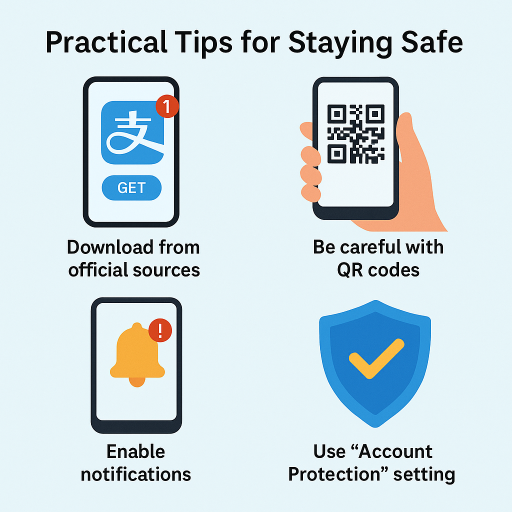
Security Measures Users Can Take
The Most Reported Fraud Tactics
Even with strong security, Alipay scams still happen—usually through human error. Tourists and newcomers are especially vulnerable. One common trick is the QR code swap. A scammer covers the shop’s code with their own. You think you’re paying a store, but your money goes to them.
Another growing scam is the fake customer service refund. You’ll get a call or message saying your recent payment failed, then someone offers to help you “verify” it—by asking for your login or a code. Don’t fall for it. Alipay never calls users for verification.
Phishing apps are another threat. Some scammers build fake Alipay apps that look real. You download them from unofficial sites, log in—and hand over your info. That’s how they drain your balance in minutes. Finally, some scams involve too-good-to-be-true cashback jobs, where you’re tricked into “investing” in fake marketing schemes through Alipay. Many victims lose thousands.
Practical Tips for Staying Safe
Avoiding Alipay scams is about basic habits, not advanced tech. First, only download Alipay from official sources—like the Apple App Store, Google Play (if available), or the official site. Don’t click random links from messages or QR codes in the street.
Second, never scan a QR code if you don’t know where it came from. At restaurants, always ask staff to show you the correct payment code. Check it closely—if it’s laminated or taped oddly, be extra careful. Look at the name on the screen before you confirm the payment.
Next, turn on every security notification possible. Set your app to notify you for every login, new device, or transfer. Check your Alipay balance and transaction history regularly. If anything looks odd, freeze your account right away—it takes seconds in the app.
Last tip: use Alipay’s “Account Protection” setting. It lets you pre-authorize trusted devices and set withdrawal limits. You don’t need to be a tech expert to stay safe—you just need to stay alert and cautious.
What Do Experts and Regulators Say About Alipay’s Safety?
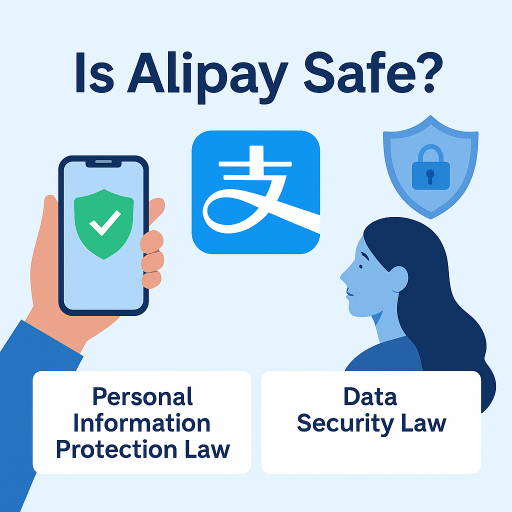
Users' property and personal data are protected by law
How Chinese Law Regulates Alipay?
Alipay isn’t just backed by technology—it’s tightly watched by law. In China, the People’s Bank of China (PBOC) oversees mobile payment platforms under a series of national laws, including the Personal Information Protection Law (PIPL) and the Data Security Law, both enacted in 2021. These laws require platforms like Alipay to get user consent, store sensitive data securely within Chinese borders, and immediately report any major security incidents. Violations can lead to heavy fines or license restrictions.
On top of that, China’s regulators have increased pressure since late 2023, rolling out new real-name verification requirements and third-party audits for all major fintech companies. For foreign users, this means the version of Alipay they access is already vetted under these standards. So while you may not feel it, the legal safety net is active behind every scan.
And the system seems to work. On February 13, 2025, Ant Group released its 2024 Consumer Rights Protection Annual Report, revealing it helped Chinese authorities block over 3.56 billion RMB (about 490 million USD) in suspicious funds last year. These weren’t just small cases—it covered everything from phishing to fake QR codes. It’s a rare example of law and AI tech working hand in hand to make mobile payments safer for everyone.
Expert Opinions on Mobile Payment Risks in China
Experts in fintech and cybersecurity have different takes, but there’s broad agreement on one point: Alipay is among the most secure mobile wallets globally—if used correctly.
Professor Chen Long, former executive at Ant Group and now dean at Luohan Academy (an Alibaba-backed think tank), said in a 2024 interview with Caixin that "China’s digital payment system has matured faster than its Western counterparts, largely due to user behavior monitoring and state-backed compliance." He noted that real-time fraud interception and centralized dispute handling give platforms like Alipay an edge.
Meanwhile, Dr. Angela Zhang, director of the Center for Chinese Law at the University of Hong Kong, pointed out that while privacy laws are evolving, the “tech-and-state integration” model used in China helps enforcement be more immediate. “It’s not GDPR,” she says, “but it works well within the local context and protects users more than people outside China often assume.”
Frequently Asked Questions (FAQs)
Q: Is it safe to connect my foreign credit card to Alipay?
A: Connecting your Visa or Mastercard to Alipay is common for short-term travelers. When doing so, Alipay’s Safety system ensures your card information stays protected through tokenized payments—this means your card details aren’t stored directly. Every time you pay, Alipay’s Safety prompts fingerprint or PIN confirmation. You also benefit from Alipay’s Safety alerts that notify you of each transaction in real-time. That way, suspicious activity is caught early. Only link your card via the official app—Alipay’s Safety doesn’t extend to third-party apps. Also, enable alerts on your bank account to double up protection. If you stop using Alipay, always unlink your card. These simple habits ensure Alipay’s Safety for foreign-linked cards remains strong and reliable.
Q: What happens if I lose my phone with Alipay logged in?
A: Losing your phone in China can be stressful, but there are safeguards. First, Alipay’s Safety system allows remote logout. You can log in from another device, access “Account Security,” and immediately log out of all sessions. You can also freeze your account temporarily. Face ID or fingerprint protection prevents unauthorized access, but we still recommend setting a strong payment password. If you can't recover your phone quickly, contact Alipay customer service—they have an English-language support line. Better yet, install “Find My Phone” on your device before traveling. Losing your phone doesn’t mean losing your funds—if you act quickly.
Q: Will Alipay work in rural areas or smaller towns?
A: Surprisingly, yes. Even in remote villages, farmers markets and small stores often accept Alipay. China has pushed mobile payment adoption across all regions. Most people carry zero cash. You’ll often see villagers scanning codes to buy groceries or even pay utility bills. That said, don’t assume signal strength is always perfect. Download an offline map and keep your phone charged. Regarding Alipay’s Safety, the system doesn’t depend on where you are—the encryption and fraud monitoring remain active everywhere. Just use the same caution as in big cities: watch for fake codes and keep your app updated.
Q: How can I check if a QR code is safe to scan?
A: Great question—since QR code scams are real. First, look for a professionally printed code, often framed or taped inside a shop counter. If someone hands you a loose paper with a code, that’s a red flag. Ask if there’s an official sign. Also, use Alipay’s built-in code scanner, which alerts you if something looks suspicious. For added peace of mind, turn on transaction notifications in settings. This way, you’ll know if anything unusual happens. Alipay’s Safety system is smart, but not foolproof. So the best defense is staying alert and not scanning anything random—especially outside busy areas.
Q: Can I use Alipay on public transport in China?
A: Yes, and it’s incredibly convenient. Subways, buses, and even bike-share systems support Alipay payments. You can scan the transit QR code, or in some cities, activate a “transport card” within the app. No need to fumble with coins or paper tickets. It’s fast and locals love it. Now, what about Alipay’s Safety while commuting? Transit payments are low-risk, but still encrypted like all others. Your ride history stays private unless you share it. If your phone gets lost or stolen, your payment data is still protected by PIN or biometric lock. So yes—ride worry-free.
Q: What should I do if my Alipay account gets locked?
A: First, don’t panic. Account locks often happen if the system detects unusual behavior—like logins from multiple locations or failed password attempts. You’ll get a message with a reason. To unlock, use the in-app help center or go through the identity verification again. Alipay has an English support option now, which helps. More importantly, Alipay’s Safety protocols work in your favor here—they’re trying to protect your funds. If you’re locked out while abroad, contacting customer service via email or social media also works. Just keep a copy of your passport ready in case you need to re-verify.
Q: Are there limits to how much I can spend with Alipay?
A: Yes, but they vary. For foreign users with Tour Pass, the wallet usually has a maximum balance of 2,000 RMB and a 90-day usage limit. These limits exist to reduce risk and maintain compliance with Chinese financial laws. Behind the scenes, Alipay’s Safety system tracks high-value purchases and flags anything unusual. You’ll receive alerts if your activity nears the limit or violates spending caps. If you link a foreign credit card, your bank’s own daily limit might also apply. These layered protections are part of Alipay’s Safety design—ensuring your funds and identity are not exposed to fraud. If you plan to stay longer, consider opening a local bank account and verifying it inside Alipay for higher limits. But for short trips, Tour Pass works fine—and safely.
Want more China travel ideas? Check out our city guides on Beijing, Shanghai, Guangzhou, and Chengdu.
